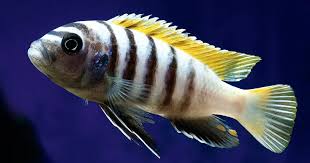
Mbuna Fish
Conditions of detention
Mbuna cichlids require a well-maintained aquarium with plenty of rocks, caves, and hiding spots that mimic their natural rocky habitat. A minimum tank size of 55 gallons is recommended, although larger tanks are preferable for housing multiple Mbuna. They thrive in hard, alkaline water with a pH between 7.8 and 8.6 and water temperatures between 75-82°F (24-28°C). Mbuna are highly territorial, so providing ample hiding spots and distinct territories within the tank is essential to minimize aggression.
Useful Fact: Overcrowding the tank slightly can help reduce aggression among Mbuna by dispersing territorial disputes among more individuals, though this requires careful management of water quality.
Nutrition and diet
Mbuna cichlids are primarily herbivorous, feeding on algae and plant matter in their natural habitat. In captivity, they thrive on a diet rich in vegetable matter, such as spirulina-based flakes, algae wafers, and fresh vegetables like spinach and zucchini. They can also be fed high-quality pellets designed for herbivorous cichlids.
Useful Fact: Avoid feeding Mbuna a diet high in animal proteins, as this can lead to digestive issues and bloat, a common ailment in herbivorous cichlids.
Health
Mbuna cichlids are generally hardy, but they can be susceptible to common cichlid diseases such as ich, fin rot, and Malawi bloat, especially if water quality is poor or if they are fed an improper diet. Maintaining optimal water quality, a balanced diet, and minimizing stress are crucial to preventing these issues.
Useful Fact: Regular water changes and maintaining stable water parameters are key to preventing health problems in Mbuna, particularly in densely stocked tanks.
Grooming and care
Mbuna cichlids do not require traditional grooming, but their environment needs to be kept clean. Regular water changes, monitoring water parameters, and maintaining a clean tank are essential to their care. Given their territorial nature, it’s also important to regularly inspect the tank for signs of aggression or stress among the fish.
Useful Fact: Mbuna enjoy digging and may rearrange substrate and decorations, so be prepared to adjust your tank setup to accommodate their natural behaviors.
Education and training
Mbuna cichlids are intelligent and can learn to recognize their owners. They may come to the front of the tank during feeding times and can be conditioned to respond to specific cues, such as the sound of food being added to the tank.
Useful Fact: Mbuna are curious and enjoy exploring their environment, so providing a dynamic and stimulating tank setup can help keep them engaged and reduce boredom.
Toys and entertainment
Mbuna cichlids enjoy exploring their environment, and providing them with a well-decorated tank that includes rocks, caves, and other hiding spots can help them feel secure. They are also known for their digging behavior, so providing them with a sandy or fine gravel substrate can encourage natural foraging.
Useful Fact: Mbuna often enjoy rearranging their environment, so consider using sturdy, unbreakable decorations that they can move without damaging them or the tank.
Safety
Mbuna cichlids are highly territorial, especially during breeding. It’s important to provide enough space to prevent territorial disputes and to choose tankmates carefully. In community tanks, Mbuna should be housed with other similarly sized, robust fish that can hold their own without provoking aggression. Avoid keeping Mbuna with species that require softer water or a different diet.
Useful Fact: Mbuna are best kept with other species from Lake Malawi that share similar water and dietary requirements to create a harmonious community tank.
Accessories
Essential accessories for a Mbuna tank include a powerful filter, as Mbuna are often messy eaters, and a heater to maintain a stable temperature. Mbuna also appreciate a tank with plenty of hiding spots created by rocks, caves, and other decorations that mimic their natural rocky habitat. A sandy or fine gravel substrate is ideal for their digging behavior.
Useful Fact: Because Mbuna cichlids are strong diggers, it’s important to secure decorations and rocks to prevent them from toppling over and injuring the fish.
Socialization
Mbuna cichlids are social fish but can be highly territorial, especially during breeding. They do well in species-specific tanks or with other robust, similarly-sized fish from Lake Malawi. When keeping multiple Mbuna together, it’s important to monitor their interactions closely and be prepared to separate individuals if aggression becomes an issue.
Useful Fact: Keeping Mbuna in slightly overcrowded conditions can help disperse aggression and prevent any one fish from becoming the target of bullying, but this requires careful attention to water quality.
Travel and Transportation
When transporting Mbuna cichlids, use a large, well-oxygenated container filled with water from their tank. Due to their size and territorial nature, it’s important to minimize stress during transport by keeping the container in a dark, stable environment. Avoid rapid temperature changes and acclimate them slowly to their new environment upon arrival.
Useful Fact: Mbuna cichlids can be sensitive to changes in water parameters during transport, so it’s important to acclimate them gradually to their new tank to avoid shock.
Behavior and psychology
Mbuna cichlids are known for their complex behaviors, including territoriality, digging, and intricate breeding practices. They are mouthbrooders, meaning females carry their eggs and young in their mouths for protection. Mbuna are also known for their strong personalities, with individuals often establishing dominance hierarchies within their tanks. Understanding these behaviors is key to providing a suitable environment that minimizes stress and aggression.
Useful Fact: Mbuna cichlids are highly territorial and will often establish and defend specific areas of the tank, especially during breeding, so providing plenty of space and hiding spots is crucial.
Legal aspects
There are generally no legal restrictions on owning Mbuna cichlids, but it’s important to ensure they are sourced from reputable breeders or suppliers. Some species of cichlids, particularly those from the wild, are protected due to over-collection or habitat loss, so it’s important to be mindful of conservation status when selecting fish.
Useful Fact: When purchasing Mbuna, consider opting for captive-bred individuals to support sustainable practices and ensure healthier, better-adapted fish for the aquarium.


